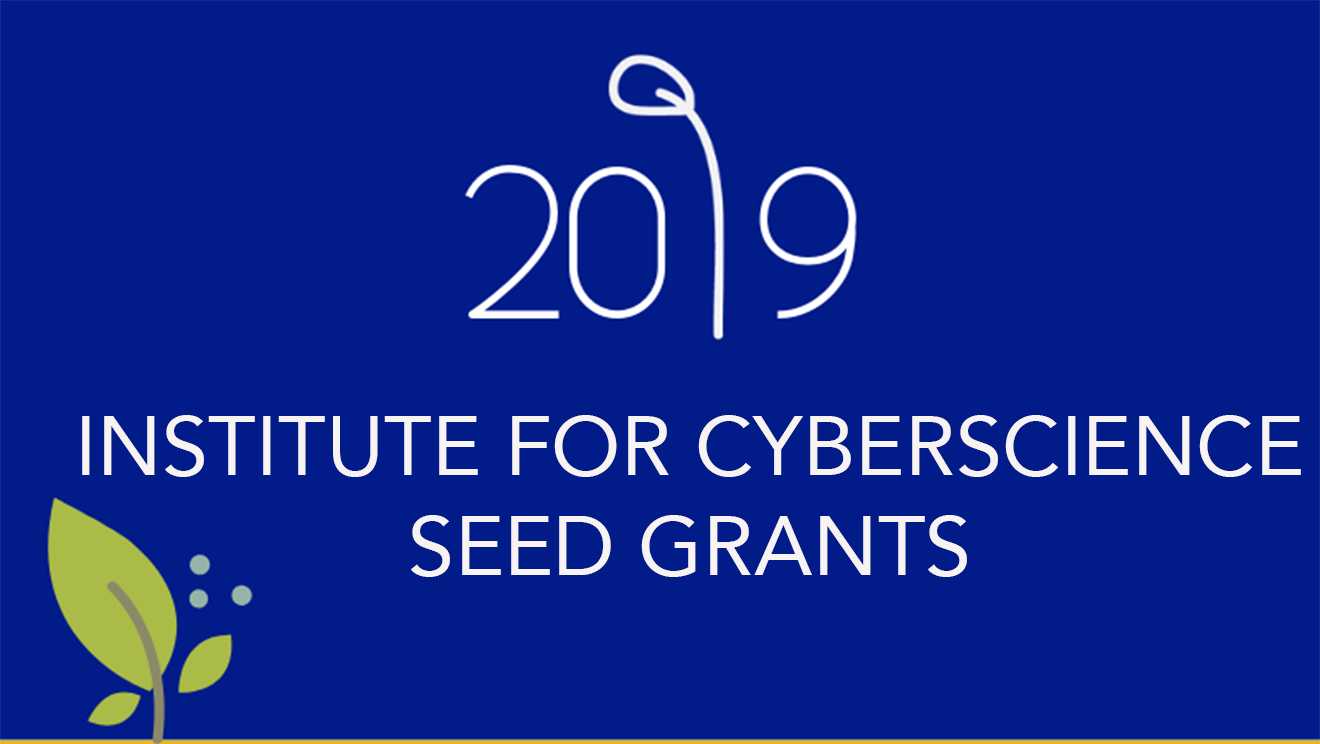
Penn State's Institute for CyberScience awarded $367,632.20 in seed grant funds to fund back projects that promote uses of and research into machine learning and artificial intelligence (AI). Image: Penn State
ICS Seed Grants to power projects that use AI, machine learning for common good
Posted on April 24, 2019UNIVERSITY PARK, Pa. — The Institute for CyberScience (ICS) announced 16 projects that are being funded through the 2019 ICS Seed Grant Program. The awards, ranging from nearly $3,000 to $35,000, will support researchers in more than 20 departments and units, 10 colleges and three institutes.
The 2019 awards, which total $367,632.20, will fund projects that promote uses of and research into machine learning and artificial intelligence (AI). The projects include research utilizing AI to: explore the human-technology frontier, understand human behavior, benefit the social good and also probe the limitations of AI and machine learning.
“This year’s ICS Seed Grant awardees demonstrate the sheer innovative, interdisciplinary power of Penn State,” said Jenni Evans, professor of meteorology and atmospheric science and director of ICS. “These projects highlight how our researchers are creatively leveraging the power of artificial intelligence and machine learning to solve the world’s biggest problems and to explore complex scientific challenges.”
The 16 selected projects include:
— Improving the Effectiveness of Team Peer Evaluations using AI. Principal Investigator (PI): Abdullah Konak, professor of information sciences and technology, Penn State Berks.
— Traffic signal control using reinforcement learning. PI: Vikash Gayah, associate professor of civil and environmental engineering. Co-PI: Zhenhui (Jessie) Li, associate professor of information sciences and technology.
— Mathematics and Applications of Machine Learning. PI: John Harlim, professor of mathematics and meteorology and atmospheric science, and ICS co-hire. Co-PI: Jinchao Xu, Verne M. Willaman Professor of Mathematics.
— BehAV: A computational framework for the automated analysis of human behavior and physiology from video. PI: Rick Gilmore, associate professor of psychology. Co-PIs: Kory Blose, assistant research professor, Applied Research Laboratory (ARL); Stephen Fast, associate research professor, ARL; and Conrad Tucker, associate professor of engineering design and industrial and manufacturing engineering.
— Numerical Modeling of Volcanic Flank Instability and Failure Forecasting using Machine Learning. PI: Christelle Wauthier, assistant professor of geosciences. Co-PI: Reuben Kraft, assistant professor of mechanical and biomedical engineering. Both Christelle and Reuben are ICS co- hires.
— Datafication of Human Behavior Through Immersive Technologies. – xR/AI Analytics for Advancing the Human-Technology Frontier. PI: Alexander Klippel, professor of geography. Co-PIs: C. Lee Giles, David Reese Professor of Information Sciences and Technology; Janet Swim, professor of psychology; Jessica Myrick, associate professor of communications and co-funded faculty of the Institutes of Energy and the Environment (IEE); and Peter La Femina, associate professor of geosciences.
— 2019 Complex Adaptive Systems Conference. PI: Nil Ergin, associate professor of systems engineering, Penn State Great Valley.
— Using AI to Improve Youth Employment in Morocco and Beyond. PI: Dongwon Lee, associate professor of information sciences and technology. Co-PIs: Xiang Zhang, associate professor of information sciences and technology and ICS co-hire; and Soo-yong Byun, associate professor of education.
— AI for Identifying and Optimizing Interactions Between Transit Systems. PI: Elizabeth Traut, assistant research professor, Larson Transportation Institute. Co-PIs: Rajesh Paleti, assistant professor of civil and environmental engineering; Amulya Yadav, assistant professor of information sciences and technology; and S. Ilgin Guler, assistant professor of civil and environmental engineering.
— Towards Accountable Decision-making in Cybersecurity via Explainable Machine Learning. PI: Xinyu Xing, assistant professor of information sciences and technology. Co-PI: John Yen, professor of information sciences and technology; Lin Lin, assistant professor of statistics and member of the Huck Institute of the Life Sciences’ Bioinformatics and Genomics program; Xingyuan (Ethan) Fang, assistant professor of statistics; and C. Lee Giles, David Reese Professor of Information Sciences and Technology.
— Improving Success Rate of Atrial Fibrillation Surgeries via Reinforcement Learning. PI: Eunhye Song, Harold and Inge Marcus Early Career Assistant Professor of Industrial and Manufacturing Engineering. Co-PIs: Hui Yang, associate professor of industrial and manufacturing engineering; Soraya Samii, associate professor of medicine; Robin Qiu, professor of information science, Penn State Great Valley.
— Machine Learning and the Preservation of Cultural Heritage on Madagascar. PI: Kristina Douglass, assistant professor of anthropology and IEE co-funded faculty member. Co-PIs: Li Guo, assistant research professor of hydropedology, Department of Ecosystem Science and Management; and Eric Burkhart, faculty instructor in ecosystem science and management and plant science program director, Shaver’s Creek Environmental Center.
— Deep Learning for CALPHAD Database Development and Uncertainty Quantification. PI: Jinchao Xu, Jinchao Xu, Verne M. Willaman Professor of Mathematics. Co-PIs: Zi-Kui Liu, distinguished professor of materials science and engineering; and Jonathan Siegel, postdoctoral scholar, mathematics.
— The Study and Simulation of the Mechanisms Driving Species Migration. PI: Katherine Zipp, assistant professor of environmental and resource economics. Co-PI: Ludmil Zikatanov, professor of mathematics.
— Leveraging AI for Game-Theoretic Models of Judicial Decision Making. PI: Ben Johnson, assistant professor of law, Penn State Law. Co-PI: Sarah Rajtmajer, assistant professor of information sciences and technology and research associate, Rock Ethics Institute.

